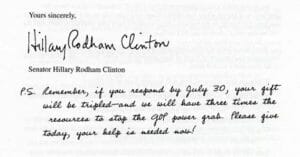Surprising but true: without a good postscript, your donors may not even read your nonprofit’s appeal letter. And that would be a shame.
How a Postscript Says “Read This Letter”
Very few of us read a letter from top to bottom, in order.
- First, the envelope helps us decide whether to open and read it at all.
- Second, the salutation draws us in or pushes us away.
- Images, captions, and subheadings all catch the eye before we ever look at the main text of the letter.
Above all (or below all!), the postscript grabs the reader’s attention. Direct mail expert Gary Henricksen quotes research that tells us:
Over 90 percent of readers read the PS before the letter. It is the first paragraph, not the last. Share on XPostscripts Raise Money
It stands to reason that the p.s.helps your nonprofit get more donations. After all, how many donors are going to pitch your letter in the recycling bin and still give you money? But don’t take it from me. Ask the experts.
A donor reading a P.S. is a donor looking for information. And that’s your opportunity. –Alan Sharpe
In direct mail (and sometimes email), the PS is the most important thing you write. It’s one of the most-read parts of your message. It’s worth spending some time on to make it really sing. –Jeff Brooks
The P.S. gives you a chance to reinforce your message and include a strong call to action right above the reply device. –Emily Hunsaker
So craft a postscript with
- What you’re asking people to give to
- How much you’re asking them to give
- And a deadline for when that gift should be given –Marc Pitman
Remember: A good PS offers some or all of the following:
- A sense of urgency
- Appreciation
- A tangible way to help
- A specific amount of money to give
- An ask for monthly giving
- A limited time opportunity –Rebecca H. Davis
Why Aren’t You Writing a Postscript?
There are all these reasons for including a p.s. with every fundraising letter, and very few reasons not to. So I’m glad to say that out of the 72 nonprofit organizations who sent me a year-end appeal, most of them (39) included a postscript.
Some of them chose to reinforce the message “Give now.” They said just that, “Give today”–or they gave me a link so I could donate online, immediately, instead of putting their letter into the pile.
Some of them gave me a tangible reason to give. They offered to send me a premium if I made my donation before the end of the year, or they appealed to my generosity by telling me my gift would be matched two or three times.
Some told me I would make a difference. Some asked me, “Do you want to accomplish” some amazing result–and urged me to answer “Yes!”
You can find samples of great postscripts just by clicking the links in this post. If you feel creative, great: write your own! But being original is not important. Capturing the reader’s attention while you have it, is.
P.S. Don’t Miss Your Chance to Get More Gifts!
If you are like the 33 other nonprofits who asked me for money at the end of 2017–the one who didn’t include a postscript–you may have missed your chance.
“May have.” Perhaps you’ve done the research, and your particular set of donors is unlike the vast majority. Maybe they read every word. Maybe they find a p.s. annoying. And maybe they are so loyal that they will give to your organization no matter what you send.
I wouldn’t bet on it.
And that is what you’re doing if you don’t include a P.S. in your fundraising appeal. You are betting the financial success of your organization on the hope that your donors are so special, you don’t have to do what works.
And if you’re wrong, some other organization is getting the donations you were hoping the donor would send to you.
Why not try it out? Make this year the year you start using postscripts to get more donations.
This is the second of a series about improving your nonprofit’s fundraising appeal letters that will appear on Communicate! throughout the next two months. Next up: the photo.


